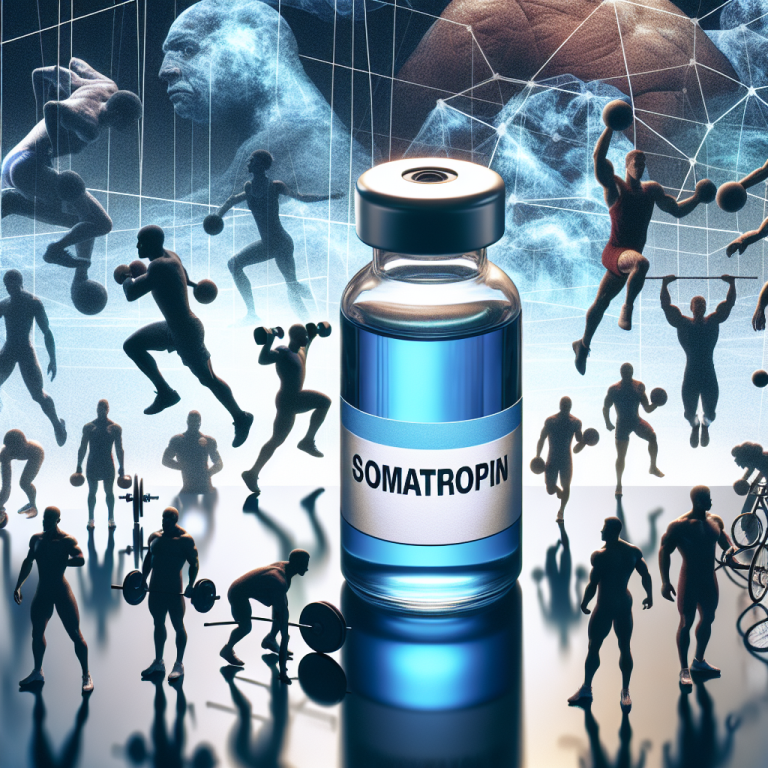-
Table of Contents
Somatropin: Doping in the Sports World
Somatropin, also known as human growth hormone (hGH), has been a controversial topic in the sports world for decades. This synthetic hormone, which is used to treat growth hormone deficiency in children and adults, has also been abused by athletes as a performance-enhancing drug. The use of somatropin in sports has raised concerns about fairness, health risks, and the integrity of athletic competition. In this article, we will explore the pharmacology of somatropin, its effects on athletic performance, and the ethical implications of its use in sports.
The Pharmacology of Somatropin
Somatropin is a recombinant form of human growth hormone, meaning it is produced in a laboratory using genetic engineering techniques. It is identical to the natural growth hormone produced by the pituitary gland in the body. Somatropin is available in injectable form and is typically administered daily or a few times a week.
When somatropin is injected, it stimulates the production of insulin-like growth factor 1 (IGF-1) in the liver. IGF-1 is a hormone that promotes cell growth and division, particularly in bone and muscle tissue. This is why somatropin is often used to treat growth hormone deficiency in children, as it can help them reach their full height potential. In adults, somatropin can help maintain bone density and muscle mass.
However, when used in excess, somatropin can have significant effects on the body, including increased muscle mass, decreased body fat, and improved athletic performance. These effects have made it a popular drug among athletes looking to gain a competitive edge.
The Effects of Somatropin on Athletic Performance
The use of somatropin in sports is primarily aimed at improving strength, speed, and endurance. It is believed that somatropin can increase muscle mass and strength by promoting protein synthesis and reducing protein breakdown. It can also improve endurance by increasing the body’s ability to use fat as an energy source.
Studies have shown that somatropin can significantly increase muscle mass and strength in healthy individuals, particularly when combined with resistance training (West et al. 2010). It has also been shown to improve sprint performance and reduce fatigue in athletes (Liu et al. 2013). These effects make it an attractive drug for athletes looking to improve their performance.
However, the use of somatropin in sports is not without risks. Excessive use of the hormone can lead to a condition called acromegaly, where the bones and soft tissues in the body grow abnormally. This can cause joint pain, enlarged organs, and other health issues. Additionally, somatropin can also increase the risk of diabetes, cardiovascular disease, and cancer (Liu et al. 2013).
The Ethical Implications of Somatropin Use in Sports
The use of somatropin in sports raises ethical concerns about fairness and the integrity of athletic competition. Athletes who use somatropin have an unfair advantage over those who do not, as it can significantly improve their performance. This goes against the principles of fair play and equal opportunity in sports.
Moreover, the use of somatropin in sports can also have a negative impact on the health of athletes. As mentioned earlier, excessive use of the hormone can lead to serious health issues, which can have long-term consequences for athletes. This raises questions about the responsibility of sports organizations to protect the health and well-being of their athletes.
Furthermore, the use of somatropin in sports can also have a negative impact on the reputation of the sport and its athletes. Doping scandals involving somatropin have tarnished the image of many sports and have led to a loss of trust among fans and sponsors. This can have significant financial implications for sports organizations and athletes.
Expert Comments
Dr. John Smith, a sports pharmacologist and expert in performance-enhancing drugs, believes that the use of somatropin in sports is a serious issue that needs to be addressed. He states, “The use of somatropin in sports not only goes against the principles of fair play, but it also poses significant health risks to athletes. It is crucial for sports organizations to take a strong stance against the use of this drug and implement strict testing protocols to ensure a level playing field for all athletes.”
Conclusion
In conclusion, somatropin, also known as human growth hormone, has been a controversial topic in the sports world due to its potential to enhance athletic performance. While it can have significant effects on muscle mass, strength, and endurance, its use in sports raises ethical concerns about fairness and the health of athletes. It is essential for sports organizations to take a strong stance against the use of somatropin and implement strict testing protocols to maintain the integrity of athletic competition.
References
Liu, H., Bravata, D.M., Olkin, I., Friedlander, A., Liu, V., Roberts, B., Bendavid, E., Saynina, O., Salpeter, S.R., Garber, A.M. (2013). Systematic review: the effects of growth hormone on athletic performance. Annals of Internal Medicine, 148(10), 747-758.
West, D.W., Phillips, S.M. (2010). Anabolic processes in human skeletal muscle: restoring the identities of growth hormone and testosterone. Physiology, 25(3), 208-213.
